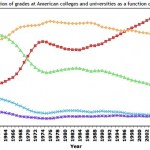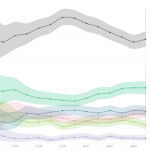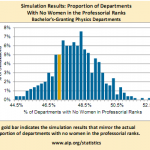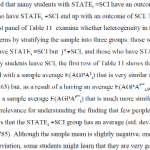Social-Science
A collection of miscellaneous stuff with an academic inclination from the past week or so:
-- We gave an exam last night in introductory E&M (I'm teaching one of five sections this term), so we've spent a lot of time this week on exam review. One thing that might be worth mentioning here is the way I run review sessions, which I don't think is entirely original to me, but which generally gets a "Huh. That's a good idea." when I explain it to other faculty, so wherever I got it from isn't well known.
What I do is: at the start of the review session (either a regular class period given over…
Kevin Drum and Aaron Carroll report on a new study of the effect of new grocery stores opening in "food deserts" in poor neighborhood. The study is paywalled, so I can't speak to the whole thing, but both of them quote similar bits making the same point: no statistically significant effects on the BMI of people in the neighborhood, and very few signs of healthier eating in general.
This is one of those studies that probably belongs in the Journal of "Well, Yeah...", because it doesn't surprise me a bit. Not for reasons that can be addressed via policy measures-- Drum quotes the study saying "…
There was a flurry of re-shares last week for this article about Yale shutting down a site that aggregated student course evaluations, which is fine as far as it goes, but repeats a stat that really bugs me:
About 43 percent of college letter grades in 2011 were A’s, up from 31 percent in 1988 and 15 percent in 1960, a 2011 study found. Over roughly the same span, the average amount of studying by people enrolled in college declined almost 50 percent, a 2011 study found, from 25 hours per week to 13 hours.
This is less bad than the usual, thanks to including the 1988 point, but it's still…
It was looking like we were going to slip through the entire Nobel season without a winner in the Uncertain Principles Betting Pool, but at the eleventh hour, we got one: DougT correctly predicted that the 2013 Sveriges Riksbank Prize in Economic Sciences in Memory of Alfred Nobel would be shared by Eugene Fama (remember, the requirement to name all the laureates for a particular prize applied only to votes for a Higgs boson prize in physics).
So, congratulations to Doug! Email me to claim your valuable prize.
The JCC day care is closed today for one of the fall cluster of Jewish holidays, which means I'm spending the morning with The Pip before Kate comes home to take the afternoon shift so I can teach my class. Thus, this is more of a tab clearance sort of exercise than a thoughtful examination of the underlying issues. But having spent a bunch of time in the recent past on gender gaps of various sorts, these are some recent links that struck me as interesting enough to pass along.
-- Via Crooked Timber, Anca Gheaus offers cheers for being the "token" woman at academic conferences. This is mostly…
There was some buzz Thursday about a poll showing that 40% of white people don't have any friends of a different race. Ipsos/Reuters include a spiffy "data explorer" where you can make graphs like the one above. It does not appear to provide an easy way to get at the actual wording of the question, which is kind of crucial, and thus renders most of the stories about it too vague to take all that seriously.
Of course, this is somewhat reminiscent of the gender bias story from a couple of weeks ago, where it was shown that single-gender physics departments are not a clear indication of sexism.…
One of my colleagues at Union is doing a physics education research project with a summer student, and is using an online survey to collect data. Obviously, the more people respond to the survey, the more scientific it becomes (subject to the limitations imposed by relying on self-selected Internet samples, of course), so I offered to plug it here. Here's the blurb and link:
I'm doing a summer research project at Union College with a student, and I need as many people as possible to fill out a survey that we created. If you complete the survey by 11:59pm (EST) on Sunday, August 11, 2013, you…
I've spent a bunch of time recently blogging about baseball statistics, which you might be inclined to write off as some quirk of a sports-obsessed scientist. I was very amused, therefore, to see Inside Higher Ed and ZapperZ writing about a new AIP report on women in physics (PDF) that uses essentially the same sort of rudimentary statistical analysis to address an important question.
I say "amused" because of the coincidence in methods, not because of the content. And, in fact, the content is... not likely to make them friends in a certain quarter of the blogosphere. I actually flinched when…
It's been a really long time since I've done a Dorky Poll here, but I'm pretty fried at the moment, so here's a kind of mathematical personality test: two numbers that do not uniquely define a sequence, but suggest some possibilities that reveal your innate character type and/or appropriate career path:
Personality Test: What number should come next in this sequence: 101, 1001,...?
Feel free to offer arguments for your chosen answer in the comments, and/or to speculate about what the hidden meanings of the options are. I'll explain the logic some other time.
(This might be too abstract for a…
There was a brief flurry of discussion yesterday kicked off by Matt Yglesias posting People Don't Major in Science—Because It's Hard, which more or less says what the title would lead you to believe (either title, since he's blogging for Slate where they like to give pages titles that don't match the post titles...). This was inspired by a National Bureau of Economic Research paper, the full text of which seems to be paywalled, sort of-- they emailed it to me at my work address for free. And since I could get it, I figured I should dig into it a bit to see what it really said.
I'm not going…
Kate had to leave at 7am this morning to go to a "retreat" for her office, so I took the kids to Dunkin' Donuts for breakfast. That got us all out the door at the same time, avoiding the freakout from The Pip if he saw Mommy leave without him. Kate will be late getting home tonight, as well, so I've got dinner with the kids as well, and SteelyKid has already declared that she wants to go to the Irish pub downtown for sweet potato fries and fish & chips.
I mention this not because I want to fill the blog with trivial details of my personal life-- that's what Twitter is for-- but because it…
Every now and then, I run across a couple of items that tie together a whole bunch of different issues that weigh heavily on my mind. That happened yesterday courtesy of Timothy Burke, whose blog post about an NPR story is so good that there aren't enough +1 buttons on the entire Internet for it.
The NPR piece is about eating and exercise habits, and the way families struggle to do what they know they ought to:
More than half of children ate or drank something during the "crunch time" window that can lead to unhealthy weight gain, as perceived by their parents. And more than a quarter of…
In which the skewing of a data plot in Ron Unz's epic investigation of college admissions makes me more skeptical of his overall claim, thanks to the misleading tricks employed.
------------
Steve Hsu has a new post on a favorite topic of his, bias against Asians in higher ed admissions. This is based on a giant article by Ron Unz that I don't have time to read, and illustrated with the graphic that's the "featured image" for this post (which I will also reproduce below for the convenience of RSS readers).
What does this show? There's a tangle of colored lines representing the fraction of…
Now that we've apparently elected Nate Silver the President of Science, this is some predictable grumbling about whether he's been overhyped. If you've somehow missed the whole thing, Jennifer Ouellette offers an excellent summary of the FiveThirtyEight saga, with lots of links, but the Inigo Montoya summing up is that Silver runs a blog predicting election results, which consistently showed Barack Obama with a high probability of winning. This didn't sit well with the pundit class, who mocked Silver in ways that made them look like a pack of ignorant yokels when Silver's projected electoral…
The Sveriges Riksbank Prize in Economic Sciences in Memory of Alfred Nobel has just been announced, and goes to Alvin E. Roth and Lloyd S. Shapley "for the theory of stable allocations and the practice of market design." I know basically nothing about these guys, but I assume they've earned their Sveriges Riksbank Prize, so congratulations to them. And congratulations also to John Novak, who correctly called Shapley in the annual betting pool.
I think that's all the winners for this year, both of Nobel Prizes and from the betting pool. If I missed one, please point it out to me. And if you…
Somebody on Twitter linked this article about "brogrammers", which is pretty much exactly as horrible as that godawful neologism suggests. In between descriptions of some fairly appalling behavior, though, they throw some stats at you, and that's where it gets weird:
As it is, women remain acutely underrepresented in the coding and engineering professions. According to a Bureau of Labor Statistics study, in 2011 just 20 percent of all programmers were women. A smaller percentage of women are earning undergraduate computer science degrees today than they did in 1985, according to the National…
Prompted by a number of people using the phrase "vast majority" recently, I wonder where the line between "majority" and "vast majority" is. Thus, a poll:
What is the minimum level of support that constitutes a "vast majority"
Assume for the sake of argument that the issue in question is a simple yes-or-no question, with only a small "no response/ don't know" fraction.
If there are other classes of "majority" that you recognize, feel free to define them in the comments. The poll is just about the term "vast," though.
As mentioned earlier in the week, I recently read Charles C. Mann's 1493 (see also this interview at Razib's place), which includes a long section about the colony at Jamestown. Like most such operations, the earliest colonists were almost comically incompetent, managing to nearly starve to death several times, despite being in an absurdly fertile region, and nearly running out of money on multiple occasions before they stumbled on the idea of tobacco as a cash crop (at which point they nearly starved again because all agricultural activity shifted to tobacco, and they needed to force people…
Back when I reviewed Mann's pop-archaeology classic 1491, I mentioned that I'd held off reading it for a while for fear that it would be excessively polemical in a "Cortez the Killer" kind of way. Happily, it was not, so when I saw he had a sequel coming out, I didn't hesitate to pick it up (in electronic form, this time).
As you can probably guess from the title and subtitle, 1493 is about what happened after Europeans made contact with the Americas. This covers a wide range of material, from straight history, to biology, to economics, but the central theme of the whole thing is basically…
The new school year is upon us, so there's been a lot of talk about academia and how it works recently. This has included a lot of talk about the cost of higher education, as has been the case more or less since I've been aware of the cost of higher education. A lot of people have been referring to a "Student Loan Bubble," such as Dean Dad, who points to this graph from Daniel Indiviglio as an illustration:
That post is a week old, which is a hundred years in blog time, and I wish I'd gotten to it sooner, because it's a terrible graph. Indiviglio says:
This chart looks like a mistake, but it…





